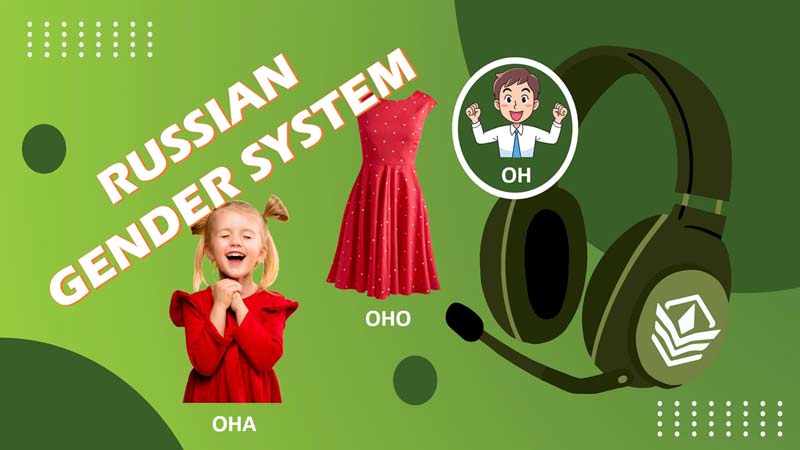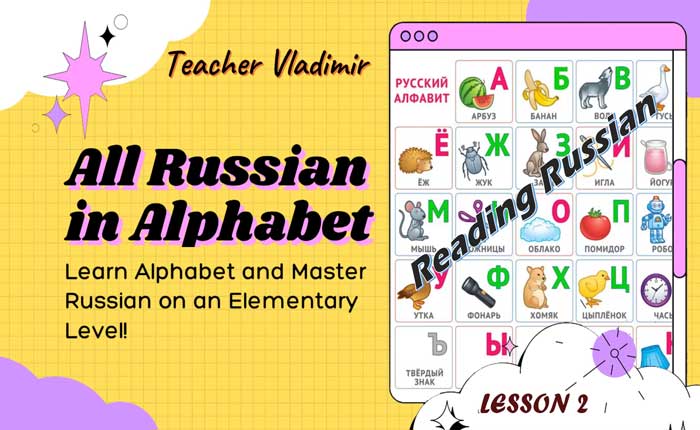In this Russian gender system article, you will learn how to understand Russian gender system and to remember Russian genders easily and quickly.
Всем привет. Здравствуйте. Как дела? Hi, everybody. I am teacher Vladimir and Be Confident in Russian Speaking Training System.
As I have explained in my previous post, you will not be able to start understanding and speaking a foreign language until you have enough listening and speaking practice. I think you understand that to have speaking practice you should speak. There isn’t any other way to learn speaking. Because we can do exactly what we learn. I am different from other teachers because instead of just explaining something about Russian language and showing example sentences, I make my students think by themselves, make Russian sentences by themselves and speak by themselves. While doing specially designed exercises with a speaking simulator and writing exercises they get automatic speaking skills and learn Russian fast. Another thing on which I make a special stress is the ability to ask questions and answer them correctly. While speaking with each other people ask questions and answer them. That is why the ability to ask questions and answer them is so important.
Speaking Russian is Easier than You Think is a series of courses where you can start to learn Russian from scratch. The only ability you should have to start learning Russian with this course is the ability to read and to write Russian. If you don’t have such an ability, learn our All Russian in Alphabet reading course. I make it free for my first students. Anyone can register and start learning reading and writing Russian.
Speaking Russian is Easier than You Think is a series of courses to master Russian step by step. Actually, it is Russian for beginners. We choose the step-by-step learning method because the Russian language is quite difficult. The main problem is ever changing endings. At that, and it is a big secret of Russian language, it is impossible to learn all those ever-changing endings by learning. They can be learned only by doing. For this purpose, we have created special learning tools and special speaking and writing exercises. Each speaking training lesson goes with the overview lesson which you can watch either in the website blog or in You Tube for free. In an overview lesson, we will learn some easy phrases that you will need in your everyday life and I will explain lesson grammar.
Then you will work with speaking simulators for each personal pronoun. Since words endings change with each personal pronoun, learning making sentences for each personal pronoun is the easiest and the quickest way to remember all those ever-changing endings.
We will start this unit with the concept of gender. But before I explain the lesson grammar, let’s lean the way Russian people greet each other and say good bye. However, at first you should understand and remember that unlikely from English where they have only one personal pronoun for the second person (you), in Russian we have three words (ты), (вы) and (Вы). We use the first one (ты) when we speak with younger people, friends, girlfriends, boyfriends, parents and wives. When we speak with many people, we use the personal pronoun (вы), which is written with a small letter ‘в’. When we greet many people, we add the ending -те to ‘здравствуй – здравствуйте’. We also should add the ending ‘-те’ when we ask other people to do something: Идите! Пишите! Читайте! Говорите!
When we speak to an older person, a girl or a woman we don’t know well, a teacher or a boss, we should use the personal pronoun ‘Вы’ with the capital ‘В’. And you should also greet such a people with the same greeting as you greet many people: ‘Здравствуйте!’ When you greet younger people or people you know well, you can say ‘Здравствуйте!’ or ‘Привет!’. ‘Привет!’ is something like ‘Hi!’ in English. When we say good bye to Russian people we should say ‘До свидания’ when you speak with older people, people you don’t know well, a teacher of a boss, or ‘Пока’ when you speak with friends or people you know well.
Russian gender system is a bit more complicated than the English one, but not as difficult as one can think. In English, people with masculine features are of masculine gender (he), people with feminine features are of feminine gender (she), non-living things and animals are of a neuter gender (it).
In Russian language, and it can be difficult to understand for learners who start to learn Russian from scratch, non-living things and animals can be also of masculine (он – he) or feminine (она – she) gender. A table (стол – он – he), for example, is a masculine noun – мужской род. The Earth (Земля – она – she) is a feminine noun – женский род. A he-cat (кот) is a masculine, a she-cat (кошка) is a feminine. Sounds a bit complicated, doesn’t it? Yes, unless you know that nouns of different genders have different endings. And it is the key to understanding the concept of Russian gender system. Endings.
Usually, masculine nouns (мужской род) end with a consonant: table – стол, father – отец, son – сын, house – дом, elephant – слон и т. д. However, you should understand and remember that some nouns with feminine endings are masculine. Man – мужчина, uncle – дядя, Dad – папа, grandfather – дедушка.
Some masculine nouns end with –ль: king – король, ship – корабль и т. д. However, there are also feminine nouns that end with –ль: salt – соль, pain – боль, moth – моль.
Feminine nouns (женский род) usually end with –а, -я, -ь: девушка – girl, Earth – земля, любовь – love, морковь – carrot e. t. c.
Neuter nouns (средний род) end with – о, -е: небо sky, дерево tree, молоко milk, солнце Sun, поле field, море sea. Coffee – кофе though it has a neuter gender is a masculine noun. Perhaps it is because the word is originated in a foreign language. The same story is with flamingo (фламинго). It has a neuter ending, but in fact it is a masculine noun. Remember it.
And at last, plural nouns (они – they). Russian plural nouns are formed by adding the ending –и (books – книги), -ы (cars – машины), -я (fields – поля, poplars – тополя).
Thus, we have learned that the key to the understanding the concept of Russian gender system is noun endings. Another thing that you should understand and remember is that non-living things can be also of masculine or feminine gender. Feminine gender usually ends with -a, -я, and neuter nouns usually end with -о, -е. There are also some excerptions that, the same as in English, you should pay a special attention to and memorize. Better, write them down into your exercise book and look at them from time to time until you remember them.
However, the much better way to memorize everything you learn and get automatic speaking skills at that is working with our unique and very effective learning tools.
In the following picture, you see a speaking simulator. It has 24 pictures of different genders. Making sentences for all the pictures and pronouncing all those sentences will help you to remember the lesson learning material, to get automatic speaking skills and to start understanding spoken Russian.
You will also do the lesson quiz and writing exercises. In the keys and answer section, you will be able to check if you did writing exercises correctly. So, what are you waiting for? Enroll to our Speaking Russian is Easier than You Think speaking training course and practice speaking Russian with our interactive and very effective speaking tools.
Bye for now. Good luck and all the best. See you at my lessons. Пока. Всего Вам доброго и удачи. Увидимся на моих уроках.



